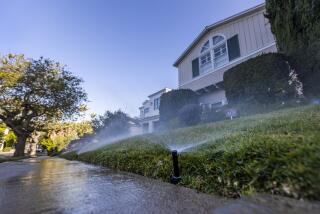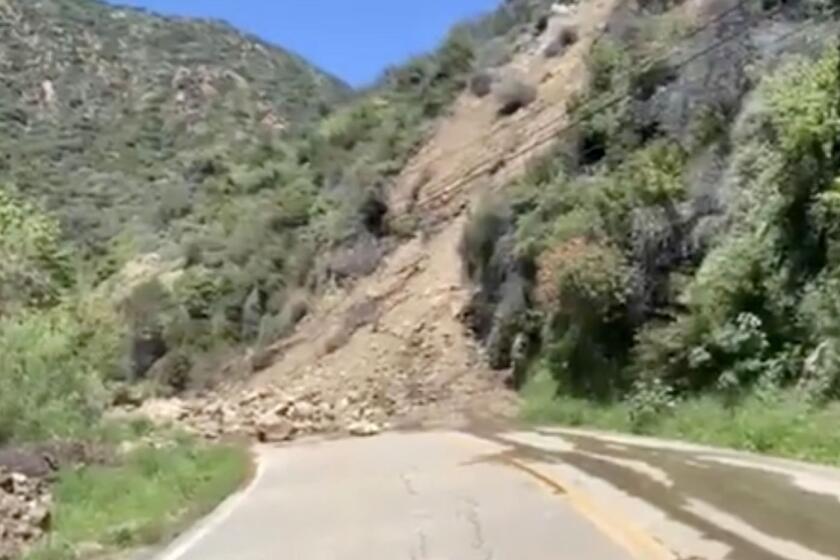Gov. Jerry Brown seeks fines of up to $10,000 a day for water wasters

SACRAMENTO — Gov. Jerry Brown wants to fine big water wasters up to $10,000 per day, one of two new efforts he announced Tuesday to battle California’s drought.
The higher penalties would be a sharp increase from the current $500 maximum that local water districts can now impose on residents and businesses.
The governor’s proposal, which must be negotiated with lawmakers, would also empower cities and counties to issue fines. Local governments would be able to enlist staff members to dish out warnings and citations, expanding the ranks of officials prodding Californians to meet conservation targets.
“Only the worst offenders” would face the maximum fines, Brown told reporters after meeting with more than a dozen mayors in the Capitol.
He did not provide specifics, and his office did not release any proposed legislation.
Brown has ordered water use to be cut 25% statewide. So far, few penalties have been issued, according to water officials.
For example, the Los Angeles Department of Water and Power had sent more than 7,300 warning letters and citations since January 2014 but issued only 10 fines as of April 6, for excessive watering.
It is unclear whether local officials would take advantage of the steeper fines the governor has proposed.
“Fines are a tool, and they’re the last tool you use,” said Felicia Marcus, chairwoman of California’s Water Resources Control Board.
Fresno Mayor Ashley Swearengin, one of 14 local leaders who joined the governor at a news conference Tuesday, said she doubts her city would issue any $10,000 fines.
“I cannot imagine for the life of me having to use that tool,” she said. “We’ve already seen our residents step up.”
Brown also announced that he was directing his administration to expedite environmental reviews of some water projects.
“There are ways to be more aggressive,” said Brown, who has faced pressure to speed construction of water infrastructure projects as the drought has continued for a fourth year.
Republicans pushed a proposal to expedite such reviews of new reservoirs, but it stalled in the Legislature on Monday when Democrats voted against it.
Brown’s announcement would not apply to reservoirs, and he did not provide specifics about what kinds of projects could be affected. But mayors at his press conference offered ideas.
Kevin Faulconer of San Diego said he hoped to accelerate work on a recycling program that could eventually provide a third of the city’s water supply. John Marchand of Livermore expressed interest in pipelines that could tap new water sources. Libby Schaaf of Oakland wants to make more recycled water available for irrigation and street cleaning.
Assembly Republican leader Kristin Olsen (R-Modesto) said Brown wasn’t going far enough to spur development of new water resources.
“It’s time to stop with the Band-Aid fixes and streamline water storage projects so we can capture water in wet years and prevent water crises for future generations,” she said in a statement.
Also on Tuesday, state water authorities issued updated use regulations, which are expected to be formally adopted next month. The rules assign conservation targets to local communities, tied to their current water use.
The state’s goals have been criticized as unfair and unattainable, but Brown has repeatedly defended them.
“We think they’re reasonable,” Brown said. “We think they’re enforceable.”
The governor’s plans to encourage conservation were set back last week when an appeals court rejected San Juan Capistrano’s policy of charging higher water rates to consumers who use more.
Brown said Tuesday that his administration was still considering its next steps, but he emphasized that the court decision did not close the door on all kinds of tiered pricing systems.
“Tiered rates have been effective,” he said. “The court has limited them. But there are still possible applications.”
Brown’s proposal to raise penalties for those who waste water was greeted warmly by Assembly Speaker Toni Atkins (D-San Diego).
“It’s clear local governments need additional enforcement tools to help them to further increase conservation and to crack down on water wasters, and the governor’s announcement helps provide those tools,” she said in a statement.
A spokesman for Senate leader Kevin de León (D-Los Angeles) declined to comment because the governor’s proposals are still under review.
Follow @chrismegerian for more updates from Sacramento.
More to Read
Start your day right
Sign up for Essential California for news, features and recommendations from the L.A. Times and beyond in your inbox six days a week.
You may occasionally receive promotional content from the Los Angeles Times.







